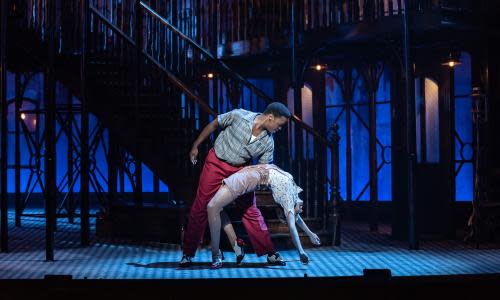The week in classical: Street Scene; SCO/ Emelyanychev – review

Sweltering heat, a crowded Manhattan tenement of people failing to mind each other’s business, Kurt Weill’s Street Scene (1946) bristles with discontent. Opera North’s new production – the company’s latest foray into musical theatre in general, Weill in particular – arrests from the start, holding its grip to the last. This isn’t always the case with this sprawling “Broadway opera”, which dates, self-evidently, from Weill’s period in American exile.
In those years, from 1935 until his death in 1950, the German composer became as fervent a New Yorker as he had been a Berliner. Street Scene’s amalgam of rich, often guttural and jazzy orchestration, natural-voice singing that teeters on operatic, and a populous ensemble cast – some 30 named roles – challenges anyone trying to stage it. The story, of immigration old and new, social hardship and stale love, can lose focus. Impassioned aria and slick jitterbug sit alongside like lion and lamb.
That range of musical expression, persuasively conducted by the Weill expert James Holmes, is part of the work’s appeal. The versatile orchestra of Opera North sounds as at home in the work’s bluesy, operatic sonorities as in Wagner or Mozart. Matthew Eberhardt, who notched up a memorable success with Trouble in Tahiti in Opera North’s 2017 Little Greats series, comes close to solving many of the work’s problems. First, the dramatic hierarchy of characters is laid out deftly. With six families, several children (outstanding in their chorus, Catch Me If You Can), and many cameos, we know exactly who to watch, who to fear. Francis O’Connor’s sets (lighting by Howard Hudson) feature a staircase, doors and landings, providing fluidity of movement as well as a sense of imprisonment.
This fiery young Russian directs from the harpsichord, crouched and compact like a champion jockey
Among the work’s standout numbers, Lonely House was beautifully delivered by the tenor Alex Banfield playing Sam Kaplan, the young Jewish trainee lawyer in love with Rose Maurrant (in an excellent, nuanced performance by Gillene Butterfield). These two singers belong to Opera North’s chorus, whose skilful members between them take on the ensemble roles.
Two company regulars, the soprano Giselle Allen and the bass-baritone Robert Hayward – last seen together in Tosca in 2018 – play the central couple, Anna and Frank Maurrant. When Hayward, always thoughtful and probing, sang Let Things Be Like They Always Was, he conveyed a regret that resonates beyond the slim offerings of the text (Elmer Rice’s book for Street Scene is based on his 1929 play, with lyrics by Langston Hughes).
Allen, too, hinted at greater complexities than apparent on paper, as the wife craving love who turns elsewhere and suffers fatally. Christopher Turner as the Italian Lippo Fiorentino led a cheerful Ice Cream chorus, and Rodney Vubya and Michelle Andrews, trained in musical theatre, mustered a lively, jitterbugging Moon Faced, Starry Eyed. That song has been stuck in my head all week, though as yet the footwork has eluded me. Catch Street Scene in Leeds, or on tour.
The Scottish Chamber Orchestra’s first “baroque week” with its new principal conductor and harpsichordist extraordinaire, Maxim Emelyanychev, also set feet tapping. The focus was on dance, by Lully, Telemann, Rameau and Bach, and its cultural importance in the 17th and 18th centuries. None of the repertoire, except Bach’s Suite No 4 in D, was especially familiar, but Emelyanychev teased his audience into appreciating the wit and invention of this music. This fiery young Russian directs from the harpsichord, crouched and compact like a champion jockey, occasionally racing a whip-arm in encouragement or restraint.
Telemann’s “Alster” suite, with its four belching horns and a crazed, sour-tuned “concerto of frogs and crows”, highlighted the anarchic tendencies of a composer sometimes thought dull. Trumpets fanfare the start (Bach) and the end (Rameau’s Les Indes Galantes suite). In between, Lully’s music for Molière’s Le Bourgeois gentilhomme, first presented at the court of Louis XIV in 1670, supplied pomp and exuberance. How the Sun King must have enjoyed that Turkish march that ends the suite, complete with a madly dinging percussion instrument like a hat-stand with bells on (called a Turkish crescent, or a jingling Johnny).
If that wasn’t enough, in the interval Emelyanychev stood among the crowd, playing a cornett and leading a handful of his brilliant musicians in two more dances: a pavan (by Thoinot Arbeau) and an anonymous tourdion, a drummer beating a processional pulse. This combination of bodhrán-style drum and dotted rhythms sounded as much like Scottish folk as French baroque. “You can dance,” invited Maxim, removing the cornett from his mouth between notes with just time to utter the words. The audience started swaying. All seemed set for a ceilidh. Wild things are in store for this orchestra and its charismatic conductor, whose contract has already been extended to 2025. Don’t miss him, or them.
Star ratings (out of five)
Street Scene ★★★★
SCO/Emelyanychev ★★★★★
Street Scene is at Leeds Grand theatre until 28 February, then touring to Newcastle, Salford Quays and Nottingham until 20 March

